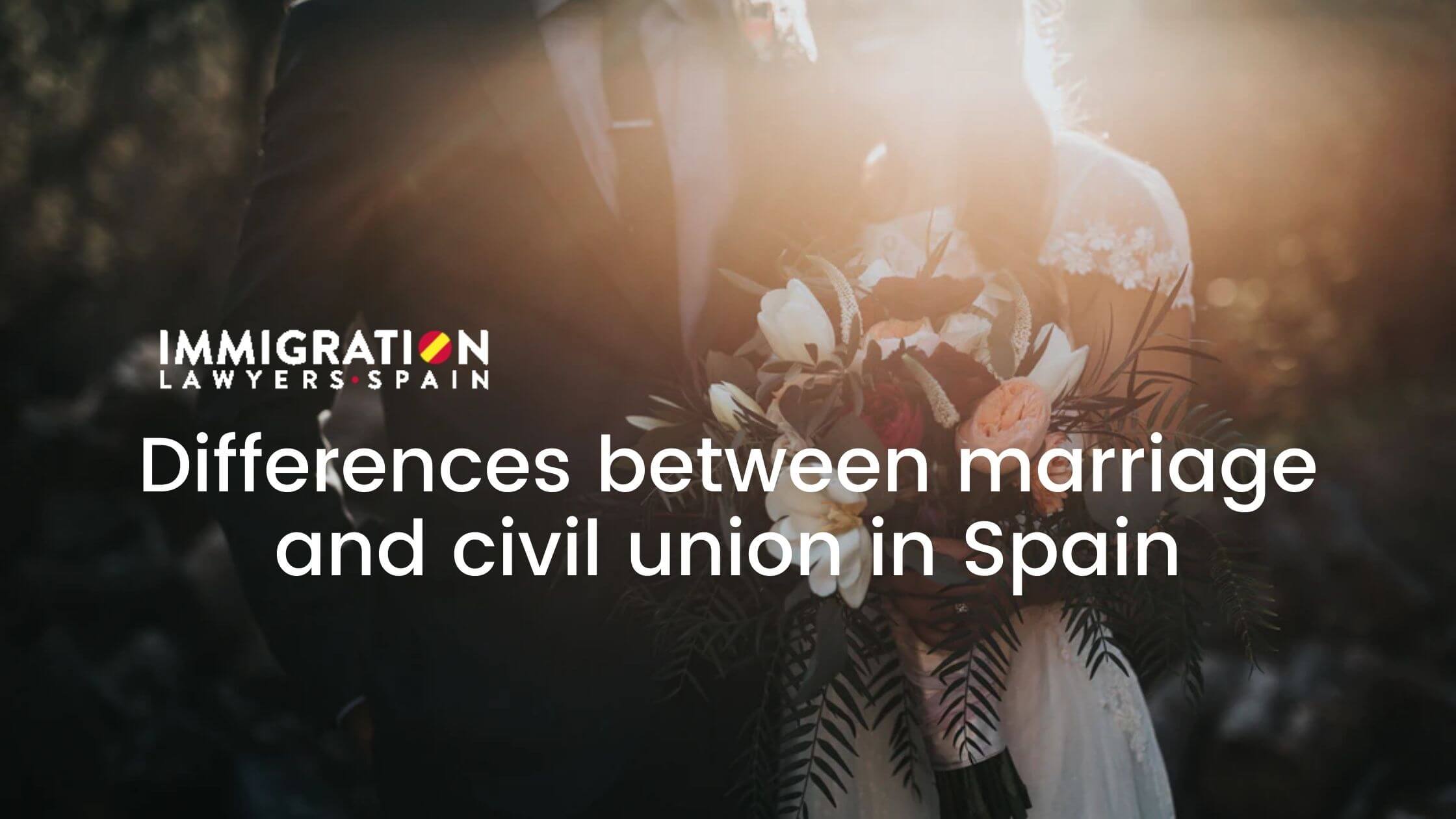
Marriage or civil union, which option should you aim for? Keep reading, because you are about to learn the main differences between these two options. In the end, you will fully understand what both paths entail and determine which is best for you in your particular case.
We will analyze the differences in terms of taxation, inheritance, compensatory pension, registration process, children and much more. Let’s get started!
Content
Toggle3 options to regulate your relationship
Generally speaking, you have three different ways to regulate your relationship with your partner in order to make it legally valid, each one of them with its own nuances.
The most important thing to consider is that each of these three institutions are totally different.
While it is true that at the civil level the figure of the civil union and marriage are nowadays really similar (implying no difference in certain aspects), each one involves a different path with different legal consequences.
In this article we will analyze in detail all the factors that make the three options differ so that you can clearly understand which one is appropriate in your particular situation.
Marriage
In Spain, marriage is the highest form of legal union between 2 individuals, from the same or different sex.
After its registration, it creates different obligations for both members, both personal and related to their wealth.
Understanding those is crucial in order to define if you rather register a civil union.
Civil partnership
Similar to marriage, but with fewer legal implications. This figure (called “pareja de hecho” in Spanish) is very popular among foreigners who wish to legalize their relationship for example for residency purposes, but who feel that the extra bureaucracy and legal implications of marriage are not worth enough.
Stable partner
It is not required to officially register your relationship with your partner to gain the legal recognition required for many procedures in Spain.
That is because the figure of the stable partnership also exists, a status that those who have been living together for at least 1 year (in or outside Spain) or who have a child in common hold.
What are the differences between civil union and marriage?
As we have just mentioned, being married or registering as a pareja de hecho are two different things, involving specific implications at the legal level.
So, what are the main differences between the two?
Analyzing each and every one of the following factors that regulate the relationship will be the key to choose which path is more appropriate according to your interests and those of your partner.
Although it is true that many of the specific points will depend on the autonomous community in which you are living (since the specific regulation changes from region to region), below you will find the main pillars that regulate civil unions and marriages in Spain.
Registration process
The first difference comes from the registration process, especially in terms of where and how it must be carried out.
- In the case of marriage, you must register the relationship in the Civil Registry of Spain.
- For civil unions, you must register it in the registry of unmarried couples of the autonomous community in which you are currently located.
- And in the case of the couples that are not registered but that cohabitate together, it is not necessary to carry out any type of procedure.
Children
This is probably one of the most important aspects that are taken into consideration when choosing between one option or the other, and most likely the reason why you have entered this post.
However, the truth is that there is no difference between the three different options when it comes to children.
The rights and obligations you will have as a parent will be exactly the same whether you are a registered domestic partner, married or are an unregistered couple.
And this uniformity also applies when the relationship is over: the measures to be adopted in relation to the children will be the same, as well as the obligations of both parents.
Do you have any doubts so far?
Breakup
What are the differences when going through a breakup process?
In the case of marriage, the process is a little more demanding. It will be necessary to complete the whole divorce process, going to the notary or court. And it is also necessary that both parties are involved in the procedure by giving their consent.
On the other hand, the civil partnership offers a higher degree of flexibility. In this case, either of the two members of the couple can terminate the relationship, and without the need to also get the consent of the other.
In the case of having children, it is necessary to regulate the legal relationship with them through the same divorce process in case of being married; whereas if you have been constituted as a common-law couple it will be necessary to complete a guardianship and custody procedure.
Assets and liabilities
Here we are referring to how assets, income and liabilities are managed between both members of the relationship, and who becomes the actual owner.
And that is something that depends on the type of economic regime applicable.
In the case of being married, you can choose between the community of property regime (i.e., all assets and debts acquired in the marriage become the possession of both partners equally); or the separation of property regime (all assets and debts acquired are property of the partner who acquired them individually).
But when it comes to civil unions, they do not have this double option, since all those duties and obligations are going to be property of the member who acquires them (separately and individually).
Taxes and Income tax declaration
How does the fact of choosing one legal option or the other affect taxation?
If you get married, you will be able to choose whether to file an individual or joint income tax return with your partner.
That is to say, there is a free choice, and to do so you will have to consider all the tax advantages of both paths and your particular situation.
But this is not the case when it comes to parejas de hecho, who do not have the option of filing a joint tax return: they can only be taxed individually (with separate income tax returns).
Holidays
Getting married means you will have 15 free days after the constitution day (i.e. 2 weeks of holidays).
However, if you register your civil union, you will not have the same luck, since unless your labor agreement states something different, you will not be entitled to days off.
Compensatory pension
The compensatory pension refers to the monetary payment that one of the two partners may receive in the event that there has been a significant economic imbalance after the disolution of the legal relationship (breakup).
What is the difference between the two options?
In the case of having constituted marriage and that it has been done under the regime of community of property, there will exist a compensatory pension, which can be requested within the same procedure opened for the whole divorce.
But if you have registered as a civil partnership, then this pension is nonexistent.
While is true that in certain Autonomous Communities it does exist, we are talking about a much longer and expensive procedure carried out in civil (and not family) court, with much lower possibilities of success.
Widow's or widower's pension
Here we find another of the most important differences between marriage and domestic partnerships.
In the case of marriage, there is a widow’s or widower’s pension from the very moment one of the spouses dies, regardless of how long they have been together.
That is unless the death was caused by common illness, in which case at least one year of marriage must be demonstrated.
In the case of civil unions, there are 2 important requirements to be met in order to receive this pension.
It will be necessary to prove that the couple has been registered for 2 years and that both members have lived together for at least 5 years.
Inheritance
If both members were married, there are certain rights over the deceased spouse:
- If there are children, the right to the usufruct of one third of the totality to be inherited.
- If there are no descendants but ascendants, the surviving spouse will receive the usufruct of half of the inheritance.
- If there are no descendants or ascendants, the surviving spouse receives the usufruct of 2/3 of the inheritance.
In the case of a domestic partnership, there is no right to inherit.
Therefore, it will be necessary to make a will and establish the desired amount to be transmitted in case that is desired; although some autonomous communities establish the same rights as in marriage in this case (as for example in Catalonia).
Immigration and citizenship
Finally, here we find another very important point to consider: the differences when it comes to the different immigration procedures.
The most common thing is for a foreigner to marry or enter into a civil partnership with a Spaniard or EU citizen in order to obtain the EU card.
But get to know what happens for unmarried partners of EU citizens when entering Spain.
In that sense, both options are totally valid to obtain this card for 5 years, so there would be no difference in terms of requirements.
But forming a civil union is a much faster process, so perhaps this would be the recommended option to speed things up and enjoy a faster resolution.
Nevertheless, marriage offers an important benefit.
If you have obtained your family member card (“tarjeta comunitaria”) by being a relative of a Spanish citizen, then thanks to that marriage you can apply for the Spanish nationality after just 1 year of legal residence in Spain.
If, on the other hand, you opt for the pareja de hecho, then you will have to wait the time established by the general regulation (without benefiting from a reduction) to obtain citizenship: 2 years for members of Latin American countries, Portugal, Equatorial Guinea and the Philippines; and 10 for the rest. But if you need help, do not hesitate on hiring an immigration lawyer.
Is civil partnership better than marriage?
Both marriage and civil unions are two legal figures that may be necessary and recommended at a certain point in our lives.
Either to obtain the Spanish residency or nationality, or because you are going to have children, joining in marriage or civil partnership can be the only way to go.
However, the differences between both institutions are important enough to make the decision rationally and objectively.
And that is what we have tried to decipher through this post, analyzing all the different factors that regulate both options.
While it is true that the greatest guarantees are contained in the figure of marriage, the domestic partnership may be the recommended option in many cases.
In short, this is a very important decision.
You should take it calmly, understand in detail all the related regulations in your particular autonomous community (since many points will be different), and ask for legal advice to know what is more appropriate for you and your family.
If you have any doubt or you would like our team to help you to make the decision, contact us today!
Get in touch with our lawyers and let us guide you step by step:





